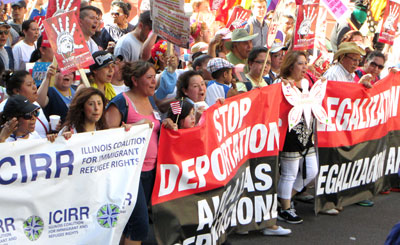

Vol. 77/No. 19 May 20, 2013

|
| Militant/Betsy Farley |
| “We’re not criminals, we are workers,” said Brian Mendoza, one of more than 3,000 participants at May 1 demonstration in Chicago, above, one of dozens around the country. |
The actions were largely organized and built by coalitions that included labor unions, church groups and immigrant advocate organizations supporting congressional immigration “reform” legislation, including a bill currently before the U.S. Senate, though many are critical of some of its provisions.
More than 3,000 people marched in Chicago. “We’re not criminals, we’re not terrorists, we are workers,” Brian Mendoza, a worker at a pallet company, told the Militant.
His coworker Luis Adalpe said that workers at the plant only earn minimum wage. “We’re fighting for something better,” he said.
“None of the proposals they’re discussing in Congress are good enough,” said Celina Martínez, a plastics worker from Des Moines, Iowa, who came to Chicago with three coworkers. “We need better ones, we need residency and the right to become citizens.”
“The companies divide us, but I’m here to speak out against mistreatment of my Latino brothers and sisters,” said Robert Hines, a warehouse worker who is African-American.
“None of us can stand by and allow brothers and sisters to be deported based on who they are and where they were born,” added Hines’ coworker Elce Redmond.
Sen. Richard Durbin, one of the authors of the bill currently before the Senate, was one of the featured speakers at the Chicago rally. “We have the best chance we’ve had in 25 years to pass comprehensive immigration reform this year,” he told the crowd. “We have to seize that opportunity.”
“The bill is a good start and it needs some improvement,” Monica Trevino, a spokesperson for the Illinois Coalition for Immigrant and Refugee Rights, which helped organize the Chicago rally, said later in a phone interview.
The bill, written by four Democratic and four Republican senators known as the “gang of eight,” holds out the promise of a more than 10-year-long, obstacle-laden “road to citizenship” for millions who qualify. It also contains provisions that deepen attacks on workers rights and further criminalize undocumented workers.
If passed, the bill would make it mandatory for all employers to use a Department of Homeland Security database to “E-Verify” if new hires have permission to work, add thousands of immigration cops at the U.S.-Mexico border, order the tripling of the number of immigrants prosecuted for felony violations for “illegal entry” or reentry into the United States, and take steps toward a national ID card that could be used to blacklist trade union militants and others who the bosses deem undesirable.
It also massively expands a “guest worker” program for agriculture and authorizes a new one for construction and industry, a big boon to bosses who complained that the Barack Obama administration’s stepped-up enforcement of immigration laws had dried up their source of cheap labor.
Several thousand marched in New York City. The march was co-sponsored by some 25 union locals and official union bodies, the May 1 coalition and immigrant groups. The leaflet was headlined, “Labor Rights, Immigrant Rights, Jobs for All: Stand Up for the Rights of All Workers to Join a Union” and continued, “This year we can pass comprehensive immigration reform.”
Laborers International Union Local 78’s spirited contingent led chants of “Union, union.” The local organizes asbestos, lead and hazardous waste handlers. “Winning rights for everyone is important for justice and our safety,” said asbestos worker Jorge Saavedra. “It’s harder to fight if you don’t have papers.”
Mariana Calle, another asbestos worker, commented on the deaths at West Fertilizer in Texas and in Bangladesh after the collapse of a building housing several garment factories. “We have better conditions because we have a union” where we work, she said.
‘Stop criminalizing immigrants’
About 50 people marched in Hempstead, Long Island.Osman Canales, a student at Suffolk Community College, listed what he saw as the problems with the gang of eight bill. “E-Verify, border enforcement, the fines, the long wait,” he said. “It’s about time for them to stop criminalizing our community.”
Workers involved in contract fights or other disputes with bosses brought their struggle to win solidarity to many of the actions. In New York City a contingent of locked-out workers from Trade Fair joined the march. Meat department workers at the supermarket chain were locked out on March 13.
Nearly a dozen workers fired from Dobake Bakery joined the demonstration in Oakland, Calif. Some 125 workers were fired recently after the immigration cops carried out an I-9 audit there.
“They gave me a letter and said I had 72 hours to get my papers straight,” said Olga Jiménez, a muffin packager who had worked at the bakery for 17 years. The fired workers demand back pay, pensions and severance pay.
Betsy Farley wrote from Chicago, Sara Lobman from New York. Laura Garza in Chicago and Willie Cotton in San Francisco contributed to this article.
Related articles:
Havana May Day march defends Cuban Revolution
Front page (for this issue) |
Home |
Text-version home